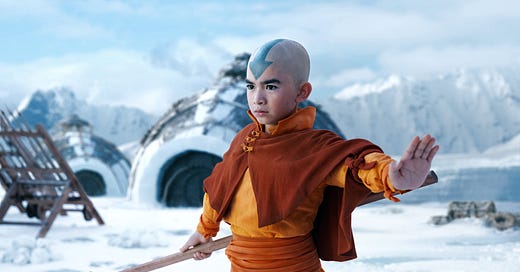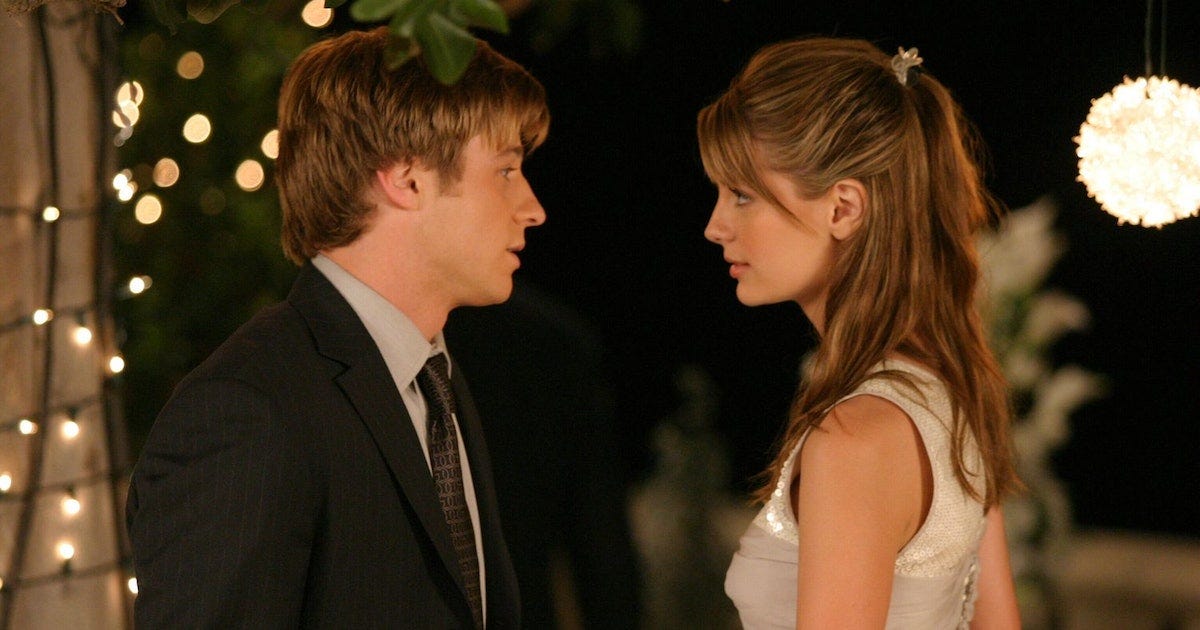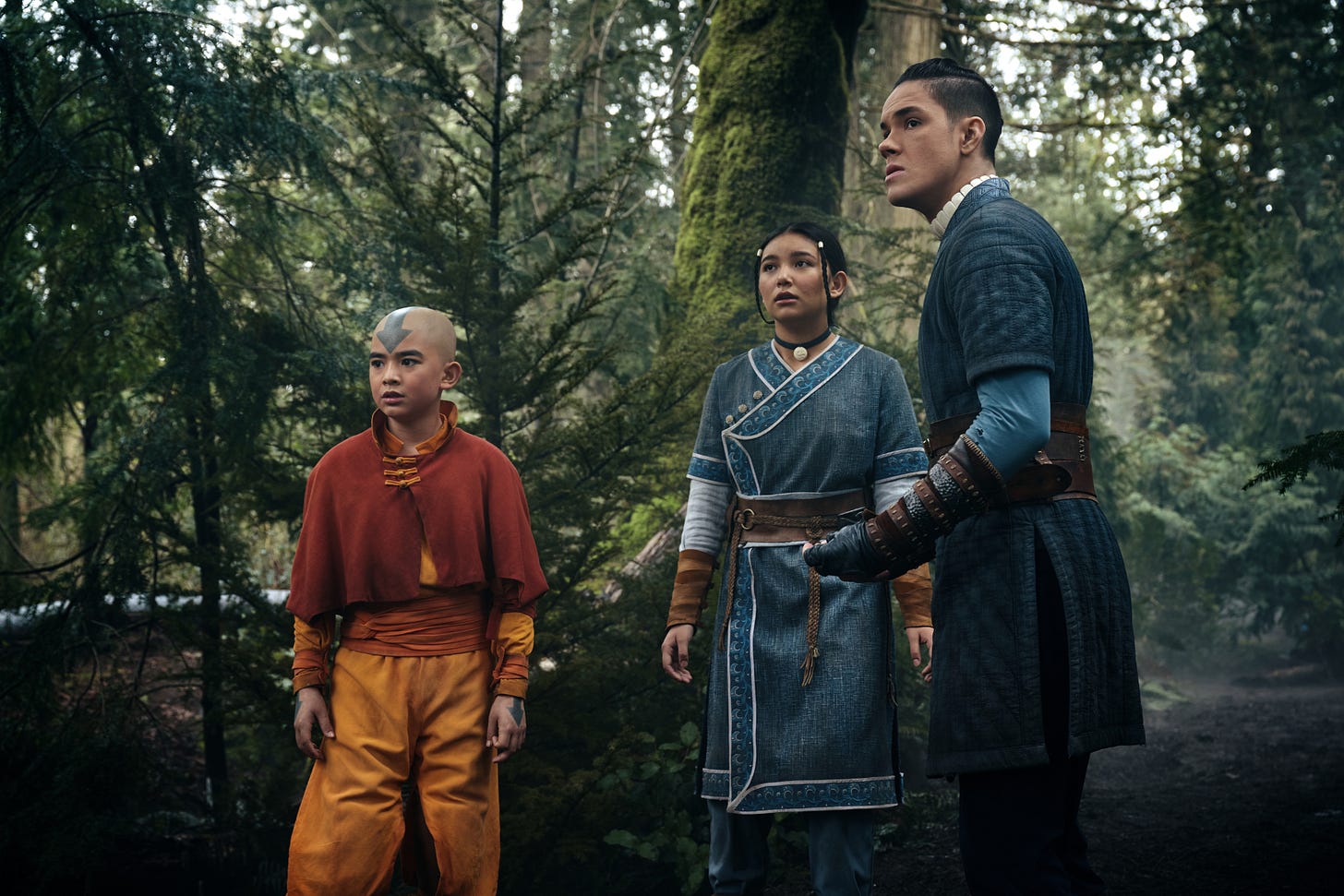Water. Earth. Fire. Air. Newsletters.
'Avatar: The Last Airbender' gets adapted again, plus the 'True Detective' finale, new 'O.C.' revelations, 'Constellation,' and more
This week’s What’s Alan Watching? newsletter coming up just as soon as I give you back your SpongeBob toothbrush…
You are now leaving Night Country. Post safely.
Many of you have already shared your thoughts on the finale of True Detective: Night Country, since I posted a link to my recap in Substack Chat on Sunday night. I thought the finale was terrific, emotionally satisfying, and smart in how it resolved enough of the mysteries while still leaving ambiguity about the presence of the supernatural, Navarro’s fate, etc. To me, it all felt very much of a piece.
Some of you disagreed, for various reasons. Reasonable minds can naturally differ, art is subjective, etc. If we all had the same opinions, what fun would it be? The discussion here for the most part remained thoughtful and respectful, which is all I ask. (My number one rule in all forms of social media: Don’t be an asshole.) In other corners of the Internet, however? Well, let’s just say that there was a very vocal subsection of the audience who were not only astounded that anyone could have liked this season, but acted offended by its very existence, and the existence of any praise it received. One of those people turned out to be the series’ creator, Nic Pizzolatto, who has continued to take public umbrage at the whole thing.
I don’t have much left to add on the subject, except for a few points:
The first five episodes of the McConaughey/Harrelson season are incredible. They’re some of the best TV of that type I’ve ever seen.
Much, if not most, of the credit for the greatness of those episodes goes much more to the two leads, and to the direction of Cary Joji Fukunaga, than to Pizzolatto’s writing, which repeated lots of serial killer cliches, and outright plagiarized dialogue from other writers’ work.
There’s a pretty significant falloff from those first five to the remaining three, and the finale is a disappointment, leaning heavily on the show’s plot, which was its weakest major element, and spending a good chunk of time on Rust and Marty battling a homicidal landscaper in a haunted house. Also, Rust’s finale monologue about the stars in the night sky is lifted from an obscure (but excellent) Alan Moore comic book called Top 10.
For various reasons, starting with the absence of Fukunaga, Season Two is a calamity on nearly every level: an attempt to do James Ellroy that instead feels like parody. The third season is significantly better, though largely due to fantastic lead performances (this time by Mahershala Ali and Stephen Dorff) transcending a gibberish plot.
All of which is to say that the Pizzolatto run did not lack for flaws. I suppose I’m happy for anyone who thinks that the first season is an unimpeachable masterpiece, or even if they think that of the Pizzolatto years as a whole. But the López season was the most watched of the entire franchise, and on Thursday HBO ordered a fifth season with her at the helm once again. So I guess some people will continue to have things to complain about?
Welcome to the new information, [rhymes-with-witch]?
As I may have mentioned once or twice in past newsletters, I wrote a book about The O.C., called Welcome to The O.C.: The Oral History, which remains available wherever books are sold. (While shopping for a coffee maker at my local Target the other day, I was pleased to see it still on the shelves, in between a new James Patterson book and John Stamos’ memoir.)
While I felt everyone was very honest and forthcoming with me about a lot of experiences on the show, there was one big subject that kept lurking between the lines of many interviews: the implication that Ben McKenzie and Mischa Barton dated at some point during production. Only one interview subject came close to outright saying it, and when I contacted them later to get clarification, they did not reply. Journalistically, I wasn’t comfortable printing that quote without a second source, because this is a much more sensitive subject than, say, McKenzie and Peter Gallagher having different accounts of a play in a flag football game with the cast.
Meanwhile, Mischa Barton herself was the last subject to agree to be interviewed. She has spoken in the past about the show being a very difficult time in her life, but never gotten into specifics, and she clearly wasn’t comfortable elaborating with me. It was a brief and very guarded conversation, and she was especially close-mouthed on the subject of McKenzie. This week, however, she opened up a bit more during an appearance on the Call Her Daddy podcast, and finally acknowledged that she and McKenzie were briefly together during the show’s first season.
For this book, I was writing as much about the experience of making the show as I was about the content of the episodes. So, for instance, I dealt a lot with Adam Brody and Rachel Bilson’s relationship — which was never a secret, and which she has discussed many times — because it was a key part of the behind-the-scenes culture of the series, and because on occasion it informed creative decisions that Josh Schwartz and company made.
Discussion of a McKenzie/Barton relationship might have offered similar insight. I could, in theory, have more directly asked the two of them, and everyone else, whether they dated at any point. But that only interested me if the conversation was clearly already leading there. And the one or two times I did explicitly ask anyone about it, I got no response. It seemed like a subject everyone knew about, but simply didn’t want to discuss, so that’s how I left it. But maybe some other, blunter, writer could have gotten somebody on the record about it if they pushed hard enough.
All of which is to say that even as I was putting the finishing touches on the manuscript, I knew there were some pretty big Mischa-related gaps in the narrative that I just wasn’t able to fill. At the same time, she’s the only one who gets to decide how much, if at all, she ever wants to publicly get into specifics about why making the show was so painful for her.
It’s not the first time I’ve missed key pieces of a story (The Revolution Was Televised has several chapters singing the praises of showrunners who were later revealed to be bad guys), nor will it be the last. But this is the business I have chosen.
What’s Alan writing?
Apple’s new Constellation has three components that should make it perfect Alan-bait: 1)Astronauts in peril, 2)Jonathan Banks playing a key role, and 3)Michelle MacLaren as the lead director. (Plus, it stars Noomi Rapace, to whom I have less of a sentimental attachment, but whom I like as an actor.) Unfortunately, the finished product is yet another streaming era example of a TV show that would have been much better off as a movie, as all the tension and mystery generated by the exciting first two MacLaren-directed episodes fizzles well before the various cliffhangers at the end of the season finale. I can’t even blame this, as I often do, on the show being created by a TV novice who clumsily expanded a feature film script they couldn’t sell, since Peter Harness has a long list of British TV credits. We’ll talk in the Avatar section about how eight episodes can feel too short, but in this case, it’s much too long.
The March issue of Rolling Stone features a package of stories about comedians, and I got to write the lead feature: an interview with Ramy Youssef about his life, the challenges and advantages of being a Muslim in a profession without a long history of Muslim and/or Arab comics, where things stand with his great Hulu series Ramy, and more. He’s an excellent talker, and selfishly, I’m glad he gave me an excuse to mention a big Knicks win in the story.
Another live-action Last Airbender
Getting back to the idea of masterpieces being worked on by new creators, we have Netflix’s new live-action version of Avatar: The Last Airbender. I wouldn’t call the cartoon unimpeachable — it struggles with its tone at times (especially early on), and has a few bumpy spots across three seasons — but on the whole it’s a classic of multiple genres, and one I’ve watched multiple times. Between M. Night Shyamalan’s catastrophic 2010 film version, and the departure of the animated show’s creators from this project over creative differences, it seemed reasonable to worry that we were heading for another mess.
But as I wrote in my review, this take on Avatar is pretty good — not great, but solid enough that fans of the original will probably enjoy it, while newcomers won’t be puzzled by the hype. There are some problems with pacing (eight episodes is definitely not enough here, even if it’s likely the most that were feasible), tone (it’s more serious, and more violent, than the all-ages cartoon), and performances (Katara, Mai, and Ty Lee are all disappointing to various degrees). But it works well enough, often enough, to be satisfying, and also works as a rebuttal to the Shyamalan mess, showing that this material can, in fact, work in three dimensions.
Still, whenever we get something like this, or the various Disney live-action remakes, or many of TV’s modern remakes and reboots — with exceptions like Mr. & Mrs. Smith — I can’t help thinking back to conversations Matt Zoller Seitz and I used to have in The Star-Ledger newsroom. This was around the time of the amazing Battlestar Galactica reboot, and Matt would always say that this is what you should do. Rather than a futile attempt to duplicate, much less surpass, a revered original, you’re much better off finding a film or show that didn’t quite work, but that had interesting ideas behind it that you think you can flesh out in a better way.
The problem with that philosophy, of course, is that in today’s “IP is everything” version of Hollywood, it’s a lot easier to get a greenlight for a project based on a title people already love, rather than something everyone remembers as mid, or worse. There can be exceptions — Oscar nominee Ryan Gosling is starring in a movie version of The Fall Guy this year — so anything is possible. But on the whole, we should expect to get more in the mode of the new Avatar than, say, someone trying a bold new spin on Sheriff Lobo or The Secret Diary of Desmond Pfeiffer. Still, I’m curious. if anybody has their own example of a “this should have been good” show they’d like to see someone take a new crack at these days.
That’s it for this week! What did everybody else think?









In episode 1 of "Constellation", Jo uses her iPad (of course, because on Apple TV+ Android products do not exist) and we see that she has the Apple TV+ app. Does that mean that she can watch the show she is on?
You're spot on in your criticism of the Pizzolatto seasons of TD, but you missed one relevant flaw: the treatment of women in those seasons suggests some retrograde sexism at best, outright misogyny at worst. Given his comments on the new woman-run/centered season, you gotta call him out on his sexist BS.